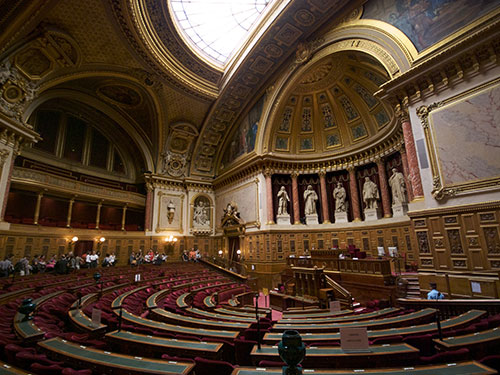No products in the cart.
The scientific programme of the Public Policies group is very closely associated with the operation of the Applied Economics Master’s degree and its three specialisations :
- the Public Policies specialisation,
- the Cultural and Digital Economics specialisation ,
- the Economics of Local Planning and Development specialisation.
The programme brings together a majority of the researchers who run these courses. It is made up of six full professors, one emeritus professor and two associate researchers: Sophie Massin and Mickael Melki.
Students and doctoral students can thus complete their training by participating in the Public Policy Seminar (S2P) and the programme’s research projects.
Its history
The scientific program “Public Policies” has a very long history at the University Paris 1 Panthéon-Sorbonne. It is the meeting of two research programmes that were organised around the Laboratoire d’Economie Publique (LAEP) and the Centre ATOM (Analyse Théorique des Organisations et des Marchés). It was directed from 2009 to 2018 by PR Pierre Kopp.
The theory of organizations and institutions has settled in the University Paris 1 Panthéon-Sorbonne thanks to the activity of the PR Claude Ménard who created and directed from 1991 to 2009 the Centre d’Analyse Théorique des Organisations et des Marchés (Centre for Theoretical Analysis of Organizations and Markets). This centre’s research focused on the economics of organisations and institutions.
The LAEP was the heir of the National Accounting and Planning Laboratory. This laboratory was one of the oldest teams at the University Paris 1 Panthéon-Sorbonne. From 1957 to 1960, the Kuznets Foundation financed research on the Séries Longues de Comptabilité Nationale. ISMEA and the CNRS then financed this research, which was located on the premises of ISMEA, Boulevard des Capucines in Paris. Jean Marczewski was the director. The first researcher recruited was Jean-Claude Toutain, who took up his post on 1 January 1957, then the following year it was the turn of Tihomir Markovitch. In 1968, the trio was joined by Louis Fontvieille. At this date, the group became a CNRS / Paris 1 laboratory and took the name of “Laboratoire de Comptabilité Nationale et Planification” (National Accounting and Planning Laboratory). It moves in 1973 to 90, rue de Tolbiac. In 1976, PR Jean Marczewski retires. His team was then merged with that of PR Jean Bénard and became the “Centre d’Économie Publique et de Planification”. He gradually integrated the contribution of the School of Public Choice into his public policy studies. F.R.P. Jacques Lecaillon and Jean-Dominique Lafay were largely involved in this reorientation. The team then took the name of Laboratoire
d’Economie Publique (LAEP) in 1992.
Its current events
The scientific program of the current team is therefore firmly rooted in the history of research at the University Paris 1 Panthéon-Sorbonne. Its originality consists in approaching public policies as legislative choices. This has led it to participate in two well-established branches of contemporary economic science: the economics of law and the school of public choice. In a democracy, a public policy is the consequence of a parliamentary deliberation in which each party to the political exchange sets out the good reasons for implementing it and allocating public funds to it. All laws voted i) to combat addiction (tobacco, alcohol, gambling, etc.) are subject to the same rules.), ii) to manage traffic congestion in large cities, iii) to protect the weaker party to the contract, in consumer
law, iv) to limit, in constitutional law, the growth of public spending and the risks of expropriation, v) to protect Internet users (digital law) from the misuse of their personal data and/or to limit the opportunism of agents in public-private partnership contracts have been the subject of debate
between experts, public agents and elected politicians.
Any choice of public policy is therefore confronted with the problem of knowledge i.e. the management of complex orders and the problem of agency; public policy can be modelled as a chain of delegation – voters delegate to elected officials who delegate to public administrations and their experts-. The risk of opportunism on the part of agents at each level of delegation can be at the origin of voters’ distrust of the principal in public policy choices. It is to these questions that the Public Policy team of the Centre d’Economie de la Sorbonne tries to answer.















